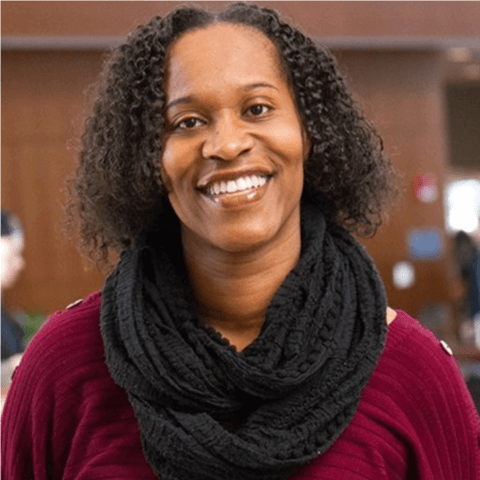Bison Trailblazers | Howard Alum Co-Creator for TV Pilot Teaching While Black
by Imani Cabassa-George
Howard’s alumni continue to drive change, open doors, innovate, and create. Dr. Donnetrice Allison is one such trailblazer. Based largely on her own experience as a faculty member at a predominantly white institution (PWI), she co-created, wrote and directed a TV pilot called Teaching While Black with colleague Aaron Moss.
The dramedy follows Shayna Black, a millennial Black professor navigates microaggressions and ignorance as she begins a career in higher education. The award-winning show was screened at the International Independent Film Awards, the Cannes World Film Festival, the International Black and Diversity Film Festival (IBDFF), the Filmteenth International Film Festival, and The Women’s Independent Film and Television Festival.
Allison sat down for an interview with The Sway to discuss the experiences that led her and Moss to create the show. This article has been condensed and edited for clarity.
The Sway: Share a bit about yourself and the experiences that led you to create Teaching While Black.
Dr. Donnetrice Allison: In 1993, I graduated undergrad and was accepted to Howard University to begin my Master’s degree in Mass Communication, but I had no idea how I was going to pay for school. After several phone calls, I learned that if I served as a teaching assistant (TA), I could earn tuition remission. Thus began my journey into the professoriate. I completed my Master’s degree in 1995, and went on to teach at James Madison University on a three-year contract. After this, I returned to Howard to work on my PhD. I continued to teach and work on my degree until I successfully defended my dissertation in 2003 and began my first tenure-track position in 2004. I have been a full-time professor at a predominantly white university (PWI) ever since, and all those years of experience are what led to the idea for Teaching While Black.
TS: As a Howard Alumni, can you talk about your experiences in the communications program or at Howard in general that led you to Teaching While Black? What transferable skills did you acquire at Howard that helped shape this TV program?
DA: The School of Communication at Howard University is where I learned how to teach, and I was part of the Preparing Future Faculty Program in the Graduate School. I remember going through a week-long training when I first became a TA for the School of Communication. The skills I learned are those I still use in my teaching. I learned how to prepare and organize my syllabus. I learned professionalism and built the confidence to go in front of a classroom full of students who, at the time, weren’t that much younger than I was.
TS: What inspired Teaching While Black? What was the process of co-creating, writing and producing your own show?
DA: The inspiration for Teaching While Black has come from years of teaching at predominantly white institutions (PWIs) and dealing with the microaggressions that come with that experience. But more specifically, the idea came to me in 2018 when I learned of the inaugural MACRO Episodic Lab script contest. I entered the contest and did not place, but a spark was lit. I thoroughly enjoyed the creative process of writing the script and was excited to return to my first love of writing. I was an English major in undergrad and I wanted to be a writer, but my life had become so busy with work and raising my children that taking the time to focus on creativity reawakened my desire to do so. As such, I continued to work on the script and entered other contests. Then, in 2022, my creative partner and I decided to shoot the pilot episode of the show ourselves and entered it into several film and television festivals.
TS: What have been the challenges and opportunities as you set this up? What have you learned about this industry?
DA: The biggest challenge has been getting exposure for the show and getting it to the gatekeepers of the industry. What I have learned about the industry is that the old saying, “it’s not what you know but who you know,” is 100 percent accurate. If you are not connected to any industry gatekeepers or people who know industry gatekeepers, it is very difficult to get exposure for your project.
TS: What are your hopes for Teaching While Black?
DA: My creative partner and I have won several awards in film festivals, but we would love to have the opportunity to pitch the show to networks for the potential opportunity to shoot a full season, given that we have written a full season of the show and plotted out a five-season arc.
TS: Who is your audience, and what do you want them to feel from watching your show?
DA: This show is for any young professional who is trying to balance their work, life, love and friendships, in the midst of today’s racial and social climate.
TS: What advice do you have for other PhD, Master’s students and alumni who are looking to tap into their creativity?
DA: Just do it! Don’t wait. Find the time. Make the time. Carve it out somewhere in your week, even if you are working full time and raising a family. I wish I hadn’t waited so long to pursue the dream that I’ve had since I was a teenager.
TS: Fun question: Do you have any New Year resolutions?
DA: Yes! To spend more time on my writing this year, and to never give up!

